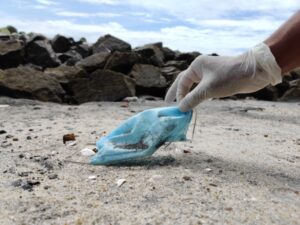South Africa, like many other countries, is facing massive challenges with regards to the safe disposal of medical waste, reports the World Health Organisation.
The WHO has cautioned that waste management systems are under threat, as medical waste from Covid-19 pandemic mounts – revealing the urgency to enhance waste management practices. Due to illegal dumping in South Africa, there is a health threat posed to both humans and the environment. Speaking to Eyewitness News, the National government director for Environmental Health, Murdock Ramathuba, acknowledged that the state is not in possession of licensed incinerators to dispose of medical waste. This means that the management of waste is solely the responsibility of the private sector, instilling doubt around the ethics and regulations of waste collection from hospitals and clinics. “Currently it’s only the private sector receiving and treating our waste before final disposal. It is costly to treat healthcare waste. The reason why the [government-owned] incinerators were discontinued was that they were not compliant,” Ramathuba said. Items such as masks, medical equipment, and syringes are being dumped, instead of being treated or burnt with suitable air-treatment control equipment. Du Toit revealed that highly guarded, unmarked, and organised vehicles are seen making their way through gravel roads to a large burning wasteland by men who want to protect their source of income. “It’s a whole supply chain – illegal operators find any dumpsite and they have now found Kya Sand where they charge illegal operators.” Johannesburg MMC for Environmental Affairs, Michael Sun said when questioned about the issue of illegal dumping. The Health Department has revealed that it currently works closely with the private sector, while it seeks government-run incinerators in efforts to comply with legal requirements and air pollution.The department stated that Covid-19 face masks and sanitiser containers would not be classified as hazardous waste, as the virus no longer becomes infectious when exposed to light or heat.
Pikitup’s acting COO, Makhosazana Baker, took note that there had been an increase in disposable masks making it to waste sites, which poses an issue since they are not being recycled despite the Disaster Management Act (published in 2020), which states that waste pickers are supposed to wear gloves and masks at all times. “How do we know of those households that are having positive cases and how do we deal with their waste stream? We are encouraging households to place masks in a plastic bag and seal it before they dump it.” Baker concluded. According to the WHO analysis, approximately 87,000 tonnes of PPE were shipped to form part of a UN initiative between March 2020 and November 2021, to support countries urgently needing such materials. “Air pollution and carcinogens created when burning waste are the biggest risks to communities,” says Montgomery. While the volumes of medical waste increased by 17% in India during the first wave, it was up by 25% in the Philippines, and carbon emissions were increased by 1% in England following the use of PPEs. Recommendations by WHO The WHO calls for reformation and the reduction of plastic packaging for medical equipment by including eco-friendly packaging and the use of biodegradable materials, while investing in non-flammable waste treatments. Further encouraging that Covid-19 protection gear be made of recyclable and reusable materials.






